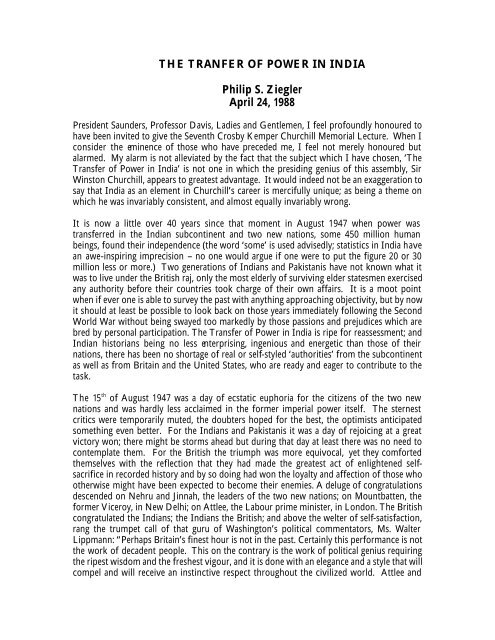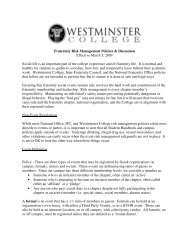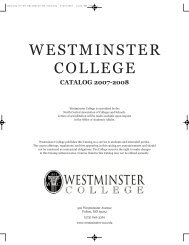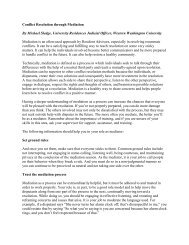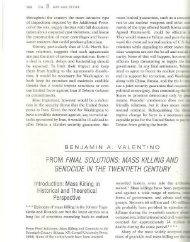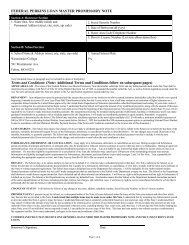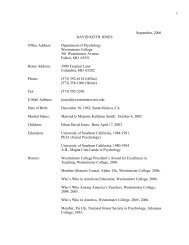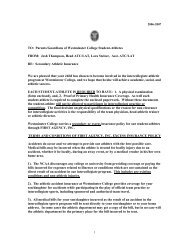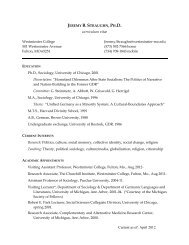THE TRANFER OF POWER IN INDIA Philip S. Ziegler April 24, 1988
THE TRANFER OF POWER IN INDIA Philip S. Ziegler April 24, 1988
THE TRANFER OF POWER IN INDIA Philip S. Ziegler April 24, 1988
Create successful ePaper yourself
Turn your PDF publications into a flip-book with our unique Google optimized e-Paper software.
<strong>THE</strong> <strong>TRANFER</strong> <strong>OF</strong> <strong>POWER</strong> <strong>IN</strong> <strong>IN</strong>DIA<strong>Philip</strong> S. <strong>Ziegler</strong><strong>April</strong> <strong>24</strong>, <strong>1988</strong>President Saunders, Professor Davis, Ladies and Gentlemen, I feel profoundly honoured tohave been invited to give the Seventh Crosby Kemper Churchill Memorial Lecture. When Iconsider the eminence of those who have preceded me, I feel not merely honoured butalarmed. My alarm is not alleviated by the fact that the subject which I have chosen, ‘TheTransfer of Power in India’ is not one in which the presiding genius of this assembly, SirWinston Churchill, appears to greatest advantage. It would indeed not be an exaggeration tosay that India as an element in Churchill’s career is mercifully unique; as being a theme onwhich he was invariably consistent, and almost equally invariably wrong.It is now a little over 40 years since that moment in August 1947 when power wastransferred in the Indian subcontinent and two new nations, some 450 million humanbeings, found their independence (the word ‘some’ is used advisedly; statistics in India havean awe-inspiring imprecision – no one would argue if one were to put the figure 20 or 30million less or more.) Two generations of Indians and Pakistanis have not known what itwas to live under the British raj, only the most elderly of surviving elder statesmen exercisedany authority before their countries took charge of their own affairs. It is a moot pointwhen if ever one is able to survey the past with anything approaching objectivity, but by nowit should at least be possible to look back on those years immediately following the SecondWorld War without being swayed too markedly by those passions and prejudices which arebred by personal participation. The Transfer of Power in India is ripe for reassessment; andIndian historians being no less enterprising, ingenious and energetic than those of theirnations, there has been no shortage of real or self-styled ‘authorities’ from the subcontinentas well as from Britain and the United States, who are ready and eager to contribute to thetask.The 15 th of August 1947 was a day of ecstatic euphoria for the citizens of the two newnations and was hardly less acclaimed in the former imperial power itself. The sternestcritics were temporarily muted, the doubters hoped for the best, the optimists anticipatedsomething even better. For the Indians and Pakistanis it was a day of rejoicing at a greatvictory won; there might be storms ahead but during that day at least there was no need tocontemplate them. For the British the triumph was more equivocal, yet they comfortedthemselves with the reflection that they had made the greatest act of enlightened selfsacrificein recorded history and by so doing had won the loyalty and affection of those whootherwise might have been expected to become their enemies. A deluge of congratulationsdescended on Nehru and Jinnah, the leaders of the two new nations; on Mountbatten, theformer Viceroy, in New Delhi; on Attlee, the Labour prime minister, in London. The Britishcongratulated the Indians; the Indians the British; and above the welter of self-satisfaction,rang the trumpet call of that guru of Washington’s political commentators, Ms. WalterLippmann: “Perhaps Britain’s finest hour is not in the past. Certainly this performance is notthe work of decadent people. This on the contrary is the work of political genius requiringthe ripest wisdom and the freshest vigour, and it is done with an elegance and a style that willcompel and will receive an instinctive respect throughout the civilized world. Attlee and
2Mountbatten have done a service to all mankind by showing what statesmen can do, notwith force and money, but with lucidity, resolution and sincerity.”It was, of course, much too good to last. Even before the celebrations in New Delhi andKarachi had run their course, the hideous massacres that accompanied partition were alreadygathering force. The atmosphere reminds one of Byron’s Brussels on the eve of Waterloo:“There was a sound of revelry by night,” the dance went on, joy was unconfined, untilsuddenly a deep sound struck like a rising knell. It was, I do not need to remind you, “thecannon’s opening roar.” That roar, or rather the anguish of the victims in the Punjab, gavenew heart to the critics of Britain’s policy. They have not ceased to be heard today and willno doubt continue so long as the story of the end of the British Empire retains itsfascination. Their voices are many and various, but in the main they fall into two categories.First there are the traditionalists who believed, and sometimes still believe, that the surrenderof power in India was the betrayal of a sacred trust, at the best premature, at the worstuncalled-for, and in either case disastrous in its consequences. On the other hand are thosewho are convinced that the transfer was essential and long-overdue but that its executionwas sadly botched; that the unity of India was sacrificed without more than a token effortbeing made to retain it; that the settlement was biased in one way or the other; that it washandled so precipitately that chaos and bloodshed inevitably ensued; and that it was so illconceivedthat it left behind it a legacy of problems that have haunted the Indiansubcontinent ever since. Not surprisingly it was the first group who were most vociferous inthe period directly after partition, the second whose criticisms have grown with the years andhave become more elaborate and sometimes more extravagant. My purpose today is to lookback at 1947 and try to conclude whether, viewed from the vantage point of contemporaryexperience, Britain should have transferred power when she did. If so, could she havehandled the transition to greater advantage and in a way that would have avoided suchhostile criticism?In a world in which Europe’s empires have almost entirely passed away and lip service atleast is paid to the doctrine of self-determination in every country which professes itselfdemocratic, it is hard to remember how substantial a body of opinion in Britain, and indeedelsewhere, believed at the end of the Second World War that imperial rule in India shouldcontinue, if not perpetually, then at least for many years. The chief proponent of his pointof view was the architect of Britain’s victory, the recently dispossessed prime minister,Winston Churchill.Churchill nourished a romantic veneration for the idea of the Indian empire coupled with amarked lack of enthusiasm for the Indian people. “I hate Indians,” he once remarked to LeoAmery. “They are a beastly people with a beastly religion.” This showed him at his mostpetulant, but even when in a more benign mood was he inclined to think that Indian soldierswere good enough to fight and if necessary die for the raj, and that some of the princescould play a decent game of polo, but that they were not equipped for anything moreonerous. It was the sacred duty of the British to rule and educate this lesser breed until suchtime, perhaps 50, perhaps 100 years ahead, when they would be fit to take on the burdenthemselves. Such an expression of his views is of course a caricature of the case that wouldhave been put forward by that most sophisticated and eloquent of statesmen, but Churchill,like many men of genius, was capable of extraordinary naivety, and India provoked fromhim reactions that would have been surprising even in a lesser man.
3There was nothing new about his attitude. It was as long before as 1931 that he hadresigned from the shadow cabinet in disgust at Baldwin’s far from radical policy towardsIndia and had fought the government’s modestly liberal India Bill, clause by clause throughthe House of Commons. It was India which proved one of the first serious causes ofdissension between Churchill and President Roosevelt, when the prime minister objectedvigorously to what he regarded as the mischievous activities of Roosevelt’s representative inNew Delhi, Colonel Louis Johnson. It was Churchill who, having grudgingly agreed that SirStafford Cripps should lead a mission to India in 1942 to discuss the grant of dominionstatus once the war was over, did everything in his power to ensure that the mission did notand could not succeed. 1947 found him still firmly entrenched in his position; deploring anysurrender of power, but most of all, one which was hurried through precipitately:“In handing over the government of India to these so-called political classes,” he protestedin the House of Commons, “we are handing over to men of straw of whom in a few yearsno trace will remain…Many have defended Britain against her foes, none can defend heragainst herself. But, at least, let us not add – by shameful flight, by a premature hurriedscuttle – at least let us not add to the pangs of sorrow so many of us feel, the taint and smearof shame.”In the inflexibility and extremeness of his attitude Churchill was unusual but by no meansunique. There were in the Conservative Party many decent and honourable men who couldnot look on the retreat from Empire with anything but anguished disapproval. Themaverick genius of their leader often alarmed and sometimes dismayed them, they found amore acceptable expression of their doubts in the voice of the veteran Fourth Marquis ofSalisbury who protested to Clement Attlee against a withdrawal from India enforced byweakness. “Is this country to go down in history,” he asked, “with the badge upon her ofbetrayal?” Attlee replied firmly that there had been no weakness and no betrayal, and wasfortified in his belief by the support of Conservatives such as R.A. Butler and the formerViceroy and Ambassador to the United States, the Earl of Halifax. The issue, indeed, wasone that to some extent transcended party barriers. Some of the most cogent argumentsagainst an early transfer of power came from the Labour Foreign Secretary, Ernest Bevin,who in January 1947 told Attlee that the defeatist attitude adopted by the Cabinet and theViceroy was undermining British foreign policy and playing into the hands of her enemies.Was the British Empire, he asked rhetorically, to knuckle under at the first blow?Yet the weakness, which Attlee denied had shaped British policy, was very plainly apparentto even the most partisan observer. To some Indian historians, indeed, it seems that thetransfer of power was no more than a surrender to force majeure and in no proper sense of thewords a deliberate act of policy on the part of the British government. There are somepowerful arguments to support their contention. Economically, militarily, administratively,politically, the case for a rapid retreat from India was very strong. Economically, Britain’sposition was pitifully weak. A quarter of her national wealth had been spent in the course ofthe war and her external liabilities amounted to well over f3,000 million – pettifoggingenough by the standards of today’s debtor nations but intimidating in 1946. India, on theother hand, had accumulated sterling balances of over f1,300 million in London. To financea sustained occupation of the subcontinent against what seemed certain to be fierce localopposition would have strained intolerably Britain’s already exiguous resources. Militarily
4the situation seemed even worse. The rapid demobilization of Britain’s conscript armies wasnot merely desirable to get the factories and mines fully operational again, but essential, ifgrowing discontent was to be contained; the servicemen remaining in Southeast Asia wouldhave required some very convincing arguments to persuade them that they should nowengage in a full-blooded campaign for the repression of Indian nationalism. The regulararmy was fully stretched by its responsibilities in Europe and the Middle East – there weremore than 100,000 men held down in Palestine alone. The Indian army had, on the whole,proved astonishingly faithful to the raj throughout the war, but the 1,000 Indian officers whoserved in it in 1939 had grown to nearly 16,000 by 1945, the ideals of nationalism were rifeamong the younger officers at least, the army’s loyalty could no longer be taken for granted.Administratively the same was true, the proportion of British officials in the Indian CivilService fell every year as less and less young Britons felt that the job offered any prospects ofa secure career for life. Indianization of the Civil Service and the judiciary had beenproceeding since the First World War. By 1945 the Indians in the higher reaches of theadministration were more numerous than the British, within a decade it was clear that theywould be in a massive majority. Finally the political pressure on Britain from the UnitedStates to dismantle its Indian empire was already powerful. The substitution of Truman forFranklin Roosevelt had perhaps somewhat muted the stridency of these demands, but theeconomic power of the United States was so absolute and their views on Indianindependence so firmly established that the factor was one which any British governmentwould ignore at is peril.So potent were all these factors that, even if Churchill had won the 1945 election, it is hardto believe he would have been able to delay the advent of Indian independence by more thana few years at the most. It was the timing and the style of the transfer of power that were inquestion, not its inevitability. But to those who see it only in terms of a British surrender, itshould be said that for the Labour leaders, for Attlee and Stafford Cripps in particular, thedecision was still made on grounds of principle. It was ten years at least since these Labourleaders had manifested their belief that India should be granted independence. The war hadprovided reasons for deferring the transition but not for challenging its validity in terms ofjustice and morality. Now the time was ripe. That it happened also to coincide with Britishinterests was a fact, but the fact did not shape their conclusions.So much then for those who said that Britain should never have yielded up its empire. Whatof those who felt the process was due, if not overdue, but that its execution was at fault?Many Indian historians believe in particular, that Britain’s most precious legacy to Asiashould have been a united India and that this heritage was thrown away with no more than atoken effort to preserve it. Some would even say that it was willfully destroyed in theinterests of securing a quick settlement. Britain, by this argument, was concerned exclusivelywith its own interests and not those of its former empire. “Mountbatten’s mission,” wroteB. Krishna, “was not so much to see a united free India as to carry out, as a trueEnglishman, Attlee’s directive – to retreat from India with honour.”That Attlee’s directive was, on the contrary, to hand over independence to a truly unitedIndia, or failing that, then at least to as closely knit a federation as could be contrived, isevident both from the formal instructions issued to Mountbatten and the Viceroy’s owntestimony. The Cabinet Mission which had visited India in March 1946 was committed tothe achievement of this end. It found an India which had been polarised as never before by
5the recent elections in which the Congress party had swept the board in almost all thepredominantly Hindu provinces while the Muslim League led by Mohammed Ali Jinnah hadcaptured 90 percent of the Muslim seats. Against this unpromising background, the Missionhad done remarkably well. It had, so far, overcome Jinnah’s resistance as to secure hisgrudging acquiescence in a form of federation. This would have conceded almost completeinternal autonomy to the Muslim provinces, while reserving issues such as defense andforeign policy to a central government. It was the Hindu Congress party which balked atthis solution, in so doing, rejecting terms which it would have grasped at eagerly only a yearlater.Then came the Muslim League’s call for a ‘Direct Action Day’ to mark its disapproval ofHindu intransigence. Riots and massacres followed, leaving more than 20,000 killed orseriously wounded in Calcutta alone. Attitudes hardened on both sides. By the timeMountbatten arrived in India in March 1947, Jinnah had reverted to the same attitude he hadtaken up before the arrival of the Cabinet Mission; he was not interested in discussing thedetails of the transfer of power, still less of any possible sharing of power between Muslimand Hindu, until the principle of a wholly independent Pakistan had been accepted. And byPakistan he made it clear he meant not what he called the moth-eaten nation over which hewas eventually to rule but a greater Pakistan to include the whole of Bengal, the whole of thePunjab, and with a corridor sweeping across north India to link the two parts of the country.The ‘great men’ theory of history tends today to be unfashionable in the ranks of academichistorians. Napoleon, Alexander the Great, Washington perhaps, left some mark on themarch of events, but to comprehend history properly, one must study the agriculture and thetrading patterns of the age, the demographic trends, the incidence of plague, the climaticvariations. There is more than a little truth in this, but as a biographer by profession I mustplead that there is room for great men too. And even if the role of the individual is oftencredited by the romantic, with greater significance than can be justified, there remains alwaysa handful of men and women who by a combination of the qualities of their characters andthe circumstances of their time exercise a decisive influence on the destinies of their fellowmen. Pre-eminent among such people was Mohammed Ali Jinnah. Gandhi was the greaterman by the standards which the world customarily applies to greatness; Nehru was moreattractive and perhaps wiser, but in Jinnah’s hands lay the destiny of united India.It is one of the more curious ironies of Indian history that Jinnah made his name as amember of the Congress Party and a champion of unity between Muslim and Hindu. In1928 he left the Congress Party in frustration at what seemed to him the exclusively Hinduaspirations of its leaders. By 1940 he was the champion of an independent Pakistan. In1946 he briefly wavered towards acceptance of some loose and, as he no doubt calculated,temporary form of federation, but the events of that year quickly cured his uncharacteristicweakness. Mountbatten arrived in Delhi to be confronted by a Muslim leader who seemedincapable of even a suspicion of inflexibility, chilly, adamant, indifferent to any efforts tochange his point of view. Patiently Mountbatten deployed and redeployed what seemed tohim the overwhelming economic and political arguments against partition; Jinnah, he wrote“offered no counterarguments. He gave the impression that he was not listening.” It wasmore than an impression. In any meaningful sense of the word, Jinnah was not listening, hehad made up his mind and closed it, nothing would induce him to reopen the question.
6Mountbatten has been accused of abandoning the idea of a united India with undue alacrity;it has been said that he had written it off in his own mind, even before he arrived in Delhi,and sought only to manoeuvre the Congress leaders so that it appeared that the initiativetowards partition came from them. This is not how Mountbatten saw it. He had been sentto India to work for a united and independent country and nothing else could, in his eyes, becounted as complete success. Partition was a defeat to be accepted with reluctance:economically damaging to both new countries, militarily disastrous, politically catastrophic.It was only when it became clear that the imposition of any form of united India would leadto civil war, that he accepted the inevitable. He was one of the last to do so. The Viceroyfound that the Congress leaders acquiesced in the dismemberment of their country withdisconcerting alacrity. Nehru himself was to say that partition had become unavoidable ayear at least before it happened. Britain can fairly be blamed for helping to create thecircumstances in which Muslim nationalism could flourish, but the decision to divide thesubcontinent was taken by the inhabitants of that region, and to the deep regret of theformer imperial power.One tantalizing query remains. Jinnah was a dying man. Already, the tuberculosis whichwas to kill him little over a year after independence, was gnawing at his strength. IfMountbatten had known, could he so have spun out negotiations that the final decision wastaken when the Muslim leader had departed from the scene, and would it have helped if hehad? The question is, of course, academic; Mountbatten did not know and so had no reasonto seek to delay matters – on the contrary, as we shall see, had every reason for hurryingthem along. My personal view is that even if he had known, or even if Jinnah had died 18months earlier than he did, it would have made little difference. It was by then too late.However much some of the Muslim leaders might have doubted the wisdom of partition,they would not have dared reject the burden which Jinnah had laid upon them. The MuslimLeague was, by 1947, irrevocably committed to the pursuit of an independent Pakistan, andnothing Mountbatten or anybody else did or said could have deflected them in their crusade.Another charge frequently levelled against the British is that the terms of the settlement wereunfair to Pakistan. Sometimes such accusations relate to the basic equipment necessary torun a state. When the vast omelette of United India had to be divided, there was noquestion of reconstituting every egg and sharing them out equitably. Rough justice had to bedone. To the minds of the Pakistanis the justice was sometimes very rough indeed. When itcame to tanks and aeroplanes for the armed forces, rolling stock for the railways, printingpresses for the production of official publications, even typewriters and telephones for thegovernment offices, India took the lion’s share. The geography of United India made itinevitable that the bulk of such material should be in the possession of the Hindus onIndependence Day. Human nature being what it is, and possession being nine points of thelaw, that is where the material remained. There was little the British could do. Mountbattendid his best to see fair play. For instance, at the end of 1947, India proposed to freeze thef30 million due to Pakistan out of the residual capital funds. Mountbatten denounced theirattitude as unwise, un-statesmanlike and dishonourable. He enlisted Gandhi as an ally, andwon the day.He had few comparable victories and got little credit for his attitude from the Pakistanis,who saw him as a puppet of Nehru and one of their most inveterate enemies. They were attheir most critical when it came to the drawing of the partition line that was to separate India
7and Pakistan. The principle was that each state or province should be allotted to India orPakistan on the basis of whether it was predominantly Hindu or Muslim. In the Punjab andBengal, however – two vast provinces in which Hindu and Muslim populations were roughlyequal – the principle broke down. In these provinces there must be partition withinpartition. Yet the two denominations did not live in neatly segregated areas but hopelesslyintermingled. In the Punjab the problem was still further bedeviled by the existence of 14million Sikhs. This warlike and intemperate race had elements of both Hindu and Muslimreligions in its faith. They disliked the one almost as much as the other, but their greater fearof the Muslims led them to make common cause with the Hindus. They too had to beaccommodated in the final settlement.To achieve the impossible and divide these provinces on a basis which would both makeeconomic and political sense and appear equitable to both parties, a British lawyer, CyrilRadcliffe, was imported. Radcliffe was a man of formidable intelligence and unquestionableintegrity, but his job, as he freely admitted, was that of the butcher rather than the surgeon.In theory he worked with the help of expert assessors drawn from both groups; in practice,since the assessors were diametrically opposed on any point of contention, he wasconstrained to make up his own mind. By the application of a pencil to a map, he carved upcommunities that had been one for centuries, severed farms from their markets, fields fromtheir water, arbitrarily created two countries where there had been one before. It was abrutal and thankless task; that he performed it to the best of his ability is accepted byeveryone capable of forming an objective opinion.Whether the British authorities, in particular whether the Viceroy, performed their task withequal impartiality is where the historians differ. Radcliffe delivered his recommendations forthe partition line on the 13 th of August 1947. Mountbatten – now renewing life as GovernorGeneral of independent India, but significantly, not of Pakistan – published them on the 16 thof August. Nothing will convince the Pakistani historians that, during those three days,Mountbatten did not tamper with the findings and, in certain small but vitally importantparticulars, amend them in favour of India. Above all, they are emphatic that he overruledor over-persuaded Radcliffe so as to ensure that three quarters of the district of Gurdaspurshould be awarded to India, thus providing the Indians with a means of access to Kashmir.The evidence is circumstantial. Radcliffe’s secretary, a week or so before, had indicated tothe Punjab government that the final partition line was likely to be somewhat morefavourable to Pakistan than, in fact, it was. Members of Mountbatten’s staff recorded thatthe Viceroy was under pressure from Nehru to amend Radcliffe’s recommendations and washaving energetically to be dissuaded from doing so. Against this, we have Radcliffe’s flatdenial that anyone had sought to influence him or to amend his conclusions. If the mainobject of such a change was indeed to allow India access to Kashmir and thus to facilitatethe accession of that state to India, then indeed Mountbatten would have been behavingeccentrically in bringing it about. At the period, he was engaged in a vigorous, thoughultimately unsuccessful effort, to persuade the Maharajah of Kashmir to follow the wishes ofa majority of his people and accede to Pakistan. The matter has never been, and I suspectnever will be decided with absolute certainty one way or the other. My own conclusion, forwhat it is worth, is that Mountbatten was perhaps tempted to succumb to Nehru’sblandishments and re-draw the partition line to India’s benefit, but that the temptation wasresisted. The risk of being caught red-handed was far too great. Whatever else Mountbatten
8may have been, he was not a fool. To imperil the whole settlement for the sake of winningsome small advantage for one side or the other would have been an act of folly.If Radcliffe had been given more time for the task, the partition line would have beenplotted on a more scientific basis. There would still have been shattering disruption to theMuslim, Hindu and Sikh communities, but some injustices and inconsistencies could havebeen avoided. The job was rushed. This charge, that the whole operation was conducted attoo breakneck a pace and insufficient time left for reflection and preparation, is the onemost widely levelled at the British government, above all at the Viceroy. It has been voicedby Hindus as well as Muslims, and by many Britons too. If only …, it said; if onlyMountbatten had allowed time to prepare people for the idea of partition; to persuade themto remain in the villages where they had been born; to let those who were determined tomove, do so in a gradual and orderly fashion, to station troops in the areas where communaltrouble was most likely. Then, goes the argument, there need have been no massacres; thegreat movements of population which triggered the worst of the bloodshed would neverhave occurred, properly escorted convoys could have moved the hard core of would-berefugees to their chosen homes.I have said already that the science of statistics in the Indian subcontinent is alarminglyinexact. Many figures have been put forward as to the number of Muslims, Hindus andSikhs who died in the communal massacres that followed partition. The nearest approach toa serious analysis that has been made suggests the death toll to have been somewherebetween two hundred thousand and a quarter of a million. The total is small compared withthe wilder estimates of a million or more. It seems smaller still compared with the millionand one-half who died in the Bengal famine of 1943. Yet it is horrifying enough. “It seemsto me immaterial” wrote Mountbatten’s Chief of Staff, General Ismay, “whether onehundred thousand or a million have actually died: or whether only three percent of thecountry is in turmoil. The essential facts are that there is human misery on a colossal scaleall around one and millions are bereaved, destitute, homeless, hungry, thirsty – and worst ofall, desperately anxious and almost hopeless about their future.”Surely, say the critics, nothing could have been worse than this? An operation which endedin such carnage must, ipso facto, have been ill-conceived and botched in its execution. Andyet the issue is not as clear-cut as this. Mountbatten was playing from a rapidly weakeninghand. All those elements which could normally have been relied on to operate themachinery of partition, were being eroded by the day: the police, the judiciary, the civilservice were running down and, with the rapid withdrawal of the relatively impartial Britishelement, were disintegrating into hostile factions. The Army, the only force that might havebeen able to control the vast disturbances in the Punjab, was itself falling a prey tocommunalism – many of its regiments could no longer be trusted to hold a fair balancebetween Muslim, Hindu and Sikh. Yet simultaneously the fires of religious hatred wereburning ever more fiercely. Once the principle of partition had been accepted, it wasinevitable that communalism would rage. The longer the period which Mountbatten leftbefore severance actually took place, the worse the tension and the greater the fear thatviolence would spread. As it was, only the phenomenal influence of Mahatma Gandhichecked the spread of the massacres to Bengal; from there they might have envelopedHyderabad or any of the other areas where Muslims and Hindus lived cheek by jowl. Twohundred thousand dead could have become two million, even twenty million.
9The only way to establish with certainty whether any other approach would have provedmore successful would be to go back to the beginning and start again, and since this recourseis mercifully denied us, one historian’s guess will remain as unverifiable as another’s. When Imyself was working on the biography of Mountbatten, I approached the controversy with anopen-mind, suspecting that there must have been bungling somewhere, but wholly without afirm foundation of fact on which to base my suspicions. I am by no means confident that Inow posses such a foundation, and have my doubts whether anybody else does either, but Ihave been convinced by the unanimity of all those who were in a position to form anopinion at the time. Civil or military, Indian or British, friend or enemy of Mountbatten, allagree that time was not merely not on his side but was his greatest enemy. The view wasenunciated most tellingly by Chakravarti Rajagopalachari, the man who was in time toreplace Mountbatten and become India’s first Indian head of state and who combinedwisdom with cunning in a way which is rarely found among us Anglo Saxons. “If theViceroy had not transferred power when he did,” said Rajaji, “there could well have been nopower to transfer.” That, in a nutshell, is the case for the way the British handled thetransfer of power in India.It would seem as if I seek to acquit the Viceroy and the British government on every charge,was the transfer of power in India then a model operation planned by wise and far-seeingstatesmen, carried through with copybook perfection? The question hardly needs an answer.Power was transferred by desperately anxious men, working in the conviction that a disasterof awe-inspiring proportions was only a few months or even weeks away, believing that animperfect settlement was far, far better than no settlement at all. In such an atmosphere itwas inevitable that there would be grave mistakes made and important decisions leftuntaken.Some of these imperfections were to impose a heavy burden on the fledgling nations. Mostnotable perhaps, was the division of Pakistan into two uneasy portions separated by morethan a thousand miles of hostile country. Racially distinct, economically impoverished, EastPakistan’s feeling that it was the poor relation in the Muslim family was encouraged by itsHindu neighbours. It proclaimed itself independent in 1971. No one had been optimisticabout the union from the start. Jinnah had believed a corridor linking East and WestPakistan was essential to its survival, Mountbatten had given the union 20 years and had notproved extravagantly pessimistic. Given the troubled history of Bangladesh, one mustwonder whether much of this misery could not have been avoided. To accept a dividedPakistan was the path of least resistance. Would it not have been possible instead to makesome grandiose deal by which Pakistan might have been compensated in the Punjab for itssurrender of a claim to East Bengal? Might Mountbatten have tried for the alternative of aunited and independent Bengal? Such options would perhaps have created more problemsthan they caused, but surely some greater efforts should have been made to avoid a so-called‘solution’ which solved nothing and merely ensured trouble in the future?And then there was Kashmir. Mountbatten was convinced that this predominantly Muslimstate, ruled by a Hindu maharaja, should follow the wishes of the majority of the people andaccede to Pakistan. But he did not devote to the subject a large enough proportion of hisenergy and persuasive powers to achieve the desired end. The Maharaja dithered, thePakistanis lost patience and sent in the Pathan tribesmen, the Maharaja panicked and
10acceded to India, Indian troops flew in, the long drawn-out imbroglio had begun. It was tobring India and Pakistan to war and today still embitters relations between the two countries.Mountbatten should somehow have contrived that the Maharaja of Kashmir took the naturalcourse and opted for Pakistan; failing that he should have aimed for partition, withpredominantly Hindu Jammu going to India and the Muslim Vale of Kashmir to Pakistan.He had an awful lot else on his mind, there is no shortage of excuses for him, yet in the lastanalysis, he failed.Bangladesh, independent and in perpetual economic crises, Pakistan under military rule,India having had its own experiments with authoritarian rule and plagued by the problem ofthe Sikhs: the history of the Indian subcontinent since independence has not been whollytriumphant. And yet how much worse it might have been. The direst prognostications ofWinston Churchill and the other opponents of the Transfer of Power have not beenfulfilled. The area has not disintegrated into an ill-stitched patchwork of warring fiefs. It hasnot moved into the Communist camp. The essential principles of democracy and equalitybefore the law, are still observed in India and there is reason to hope that Pakistan has notfinally abandoned them. Perhaps most striking of all, the individual from the West, above allthe English speaker, is welcome throughout the subcontinent and can feel at home in a wayhe will hardly experience in any other country with so different an ethnic and culturalbackground.I do not come here to argue the pros and cons of imperialism. There is no lack of far betterqualified historians who can and do contest whether the British presence in India wasjustified at the outset and, given that the empire had come into being whether and when itshould have been brought to an end. All I would say is that the history of the subcontinentsince 1947 suggests that the servants of the raj did not do too bad a job, and that the legacythey have left India, is not one of which Britain need feel ashamed. And though the detailsof the transfer of power have been justly criticised and the settlement which it introducedhas been modified in important aspects, the essentials have withstood the tests of time.Perhaps Walter Lippmann went too far when he described it as a “work of political geniusrequiring the ripest wisdom and the freshest vigour,” but at the least, it was the work ofhonourable men toiling to the best of their abilities in conditions of almost impossibledifficulty. Of their labours too, Britain has no cause to feel ashamed.


